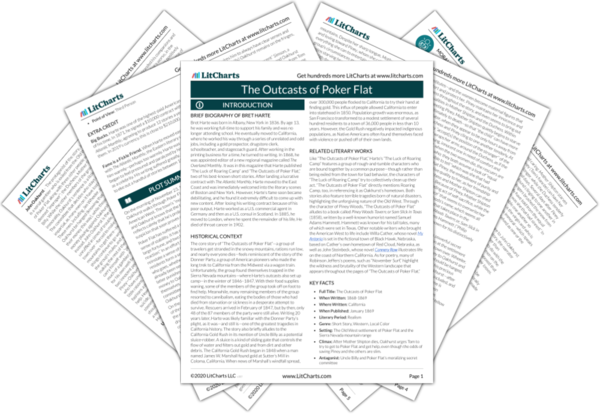Tom Simson Quotes in The Outcasts of Poker Flat
He started to his feet with the intention of awakening the sleepers, for there was no time to lose. But turning to where Uncle Billy had been lying, he found him gone. A suspicion leaped to his brain and a curse to his lips. He ran to the spot where the mules had been tethered; they were no longer there. The tracks were already rapidly disappearing in the snow.
The momentary excitement brought Mr. Oakhurst back to the fire with his usual calm. He did not waken the sleepers.
“Luck,” continued the gambler, reflectively, “is a mighty queer thing. All you know about it for certain is that it’s bound to change. And it’s finding out when it’s going to change that makes you. We’ve had a streak of bad luck since we left Poker Flat,—you come along, and slap you get into it, too. If you can hold your cards right along you’re all right.”
The third day came, and the sun, looking through the white-curtained valley, saw the outcasts divide their slowly decreasing store of provisions for the morning meal. It was one of the peculiarities of that mountain climate that its rays diffused a kindly warmth over the wintry landscape, as if in regretful commiseration of the past. But it revealed drift on drift of snow piled high around the hut,—a hopeless, uncharted, trackless sea of white lying below the rocky shores to which the castaways still clung.
Some months before he had chanced upon a stray copy of Mr. Pope’s ingenious translation of the Iliad. He now proposed to narrate the principal incidents of that poem—having thoroughly mastered the argument and fairly forgotten the words—in the current vernacular of Sandy Bar. And so for the rest of that night the Homeric demigods again walked the earth. Trojan bully and wily Greek wrestled in the winds, and the great pines in the cañon seemed to bow to the wrath of the son of Peleus. Mr. Oakhurst listened with quiet satisfaction. Most especially he was interested in the fate of “Ash-heels,” as the Innocent persisted in denominating the “swift-footed Achilles.”
Day by day closer around them drew the snowy circle, until at last they looked from their prison over drifted walls of dazzling white, that towered twenty feet above their heads. […] The lovers turned from the dreary prospect and looked into each other’s eyes, and were happy. Mr. Oakhurst settled himself coolly to the losing game before him. The Duchess, more cheerful than she had been, assumed the care of Piney. Only Mother Shipton—once the strongest of the party—seemed to sicken and fade.












